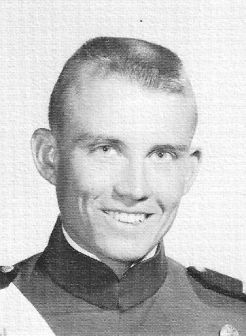
Carter's History
Gone But Not Forgotten
 Colonel Hugh Carter Whatley, United States Air Force Academy Class of 1964, passed away in his sleep early on the morning of January 10, 2002, after a nearly five-year battle with ALS. He was buried with full military honors at Arlington National Cemetery Family from the Washington D.C. area, Georgia, Louisiana, and Texas, as well as friends from his Academy days and Air Force and civilian careers attended the ceremony.
Colonel Hugh Carter Whatley, United States Air Force Academy Class of 1964, passed away in his sleep early on the morning of January 10, 2002, after a nearly five-year battle with ALS. He was buried with full military honors at Arlington National Cemetery Family from the Washington D.C. area, Georgia, Louisiana, and Texas, as well as friends from his Academy days and Air Force and civilian careers attended the ceremony.
Carter grew up in Glendale, AZ where his parents imbued him with a love of nature. Along with his older brother Johnny he assembled a small zoo in their backyard. By the time the two boys reached high school they had collected a flock of prizewinning racing pigeons, a family of squirrels, a collection of snakes and other desert creatures and had even raised a pair of baby alligators to adolescence in their own bathtub. It's no surprise then that in later life he became a dedicated bird watcher — a fitting hobby for a man who would spend his early career flying.
Carter also had a keen interest in public policy — from his international affairs studies at the Academy to his second career as a university professor. He came of age during the Cold War, and the pivotal events of this long struggle served as mileposts of his career. His career began in the cockpit of an F-4. By age 24 he was flying combat missions over Vietnam. He served two additional combat tours in Southeast Asia before that conflict ended.
In 1980, Carter accepted one of the most memorable challenges of his career by becoming the commander of the American Element at the Berlin Air Safety Center (BASC). The years in Berlin were a special time for him and his family. His job required him to negotiate daily with his colleagues in the British, French, and Soviet militaries to ensure the safety of flights in and out of West Berlin. It provided fascinating opportunities to witness the effects of the Cold War first hand — from the wall that divided the city to the Polish aircraft high-jacked to West Berlin in a desperate bid for freedom.
Following the assignment in Berlin, Carter's career also took him to HQ Electronic Security Command and the 6960th Electronic Security Wing at Kelly AFB, TX; the 65th Air Division at Sembach AB, Germany; and the Air War College at Maxwell AFB, AL. In 1991, he retired from the Air Force after 27 years of service.
Carter turned his interest in public affairs and his love of learning into a second career. At age 52 he earned his Doctorate from the University of Alabama. He and Jo returned to her native Texas, where Carter became a professor of political science and public administration at Texas A&M Corpus Christi. It was a perfect fit for him. The work and the relationships he developed with the faculty and students were truly rewarding. Having passed this interest down to his children, he led great discussions about current events during their visits and arranged for them to discuss their own international work as occasional guest lecturers to his classes. Corpus Christi was also an ideal place for Carter to pursue his bird watching, and he quickly became a fixture on area bird counts.
Though Carter was dedicated to his work, he was equally dedicated to his family. He met his wife, Jo, while in pilot training in Texas. They married in 1967 and raised two children together — Jennifer and Chris. Carter gave his children more than an interest in public policy. He gave them an example of a life well lived. He was a man of intelligence. integrity, common sense, and a mischievously dry sense of humor. He was also a quiet man who led not so much by his words as by his actions. In remembering Carter, Jo aptly described him as the “strong, calm center that we all revolved around.”
(Submitted by Jennifer Whatley, his daughter, Gone But Not Forgotten, Checkpoints, Summer 2002)
[ Home ] [ Table Of Contents ]